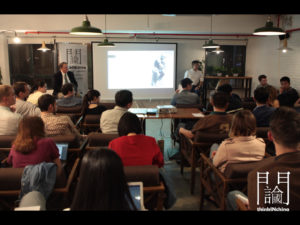

SPEAKERS
Ray CAMPBELL, Professor of Law, Peking University School of Transnational Law
Benjamin LIU, Senior Lecturer, University of Auckland
VIDEO INTERVIEW (on YouTube)
REPORT
According to Clarke’s Third Law, the most cited from the set of adages formulated by science fiction writer Arthur Clarke, any sufficiently advanced technology is indistinguishable from magic. Professor Ray Campbell started his talk by quoting Clarke’s Third Law to show people’s general impression towards Artificial Intelligence, which involves both admiration and skepticism. These mixed feelings are relevant because, given the public role of law and the several ethical implications linked to the application of Artificial Intelligence to this field, the analysis of the shifting balance between the two will probably enable us to predict whether of not we will see AI judges and courts in the future.
Within the last 15 years, AI has gone through numerous improvements, the most important being the development of deep learning: thanks to this progress, scientists have been able to replicate the way the human brain works and AI is now able to process unstructured problems, even though it won’t probably reach the human level of intelligence before the next 50 to 100 years. This development was also made possible by the process of “datification” that has occurred in the last years and has opened up further developments and applications for this potentially life-changing technology. As highlighted by professor Campbell, deep learning is data-based: it is possible only when huge piles of data exist and, thanks to complex algorithms, can be analyzed in order to identify connections among them; thus, given the unrivaled data availability and a Privacy Law way more permissive than in many other countries, China has a very important advantage in this field.
Nevertheless, the fact that AI deep learning is data-based presents an inherent issue, that is of particular relevance once applied to crafting of legal opinions and decisions: the risk of replicating bias built into the structure of the system and the datasets it relies on, such as racial and sexist prejudices. For instance, professor Benjamin Liu presented the case of Compas, a risk assessment software tool widely used in the United States’ court system, which analyzes over one hundred features and generates a risk score of reoffending within 2 years. In fact, evidences from Compass assessments show that black defendants were far more likely to be given a higher risk score of reoffending than white defendants.
Professor Liu also highlighted some other disadvantages related to the use of such a big amount of data processed through AI softwares. These are the issue of public access to those data, when they are used to convict the defendant, and the lack of motivations behind the decisions. In fact, those AI softwares are very useful to find correlations among data, like among previous cases and decisions, but they are unable to explain the reason why these data are linked to each other or are considered more or less relevant to the case.
According to professor Liu, the application of AI to the functioning of the legal system may offer a solution to the problem of access to justice. This is again particularly true in the case of China, where Artificial Intelligence is at the center of the legal system’s reform. Indeed, its application may help not only to improve the functioning of the justice system but also to offer new, less onerous methods for resolving grievances. For instance, the government of Kunming has set up a public legal service online platform where citizens can have access to a legal advisory robot: it provides free legal advices and services on a 24-hour basis thorough the use of advanced Artificial Intelligence techniques. Moreover, AI softwares can perform a number of simple functions such as scheduling and processing data and evidences, providing legal research, reviewing submitted documents and, in their turn, drafting simple ones: these are all basic tasks that can easily be disaggregated and assigned to AI robots and softwares, in order to save judges’ time and speed up the functioning of the legal and justice system as a whole.
The final question then is: will the advantages brought about by the application of Artificial Intelligence to the functioning of the legal system outweigh its disadvantages?
The answer is not an easy one, because it raises both technical and ethical questions. Indeed, regardless of how smart AI can become, it will never have the subjective experience that humans have. In the words of professor Liu: if a man wants to learn how to swim, he can read many books about swimming, but he will never have the perception of how swimming really feels like until he jumps into the water. At the end of the day, both speakers agreed on the fact that AI is very useful to assist and speed up the work of judges, but it is still unable to replace them. But as China shows, there is much room for improvement and thanks to technological advancements, AI robots of the future will possibly be able to perform an increasing number of functions. Once the technical issues are solved, however, the ethical questions still remains; quoting Professor Campbell: are we ready to have a machine deciding our basic rights?
Report written by Giulia Delgrosso